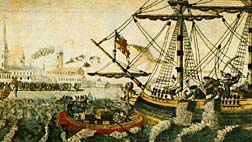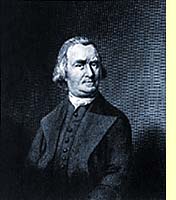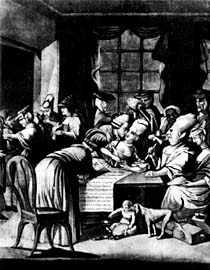Reports on the progress, setbacks, and successes of the American Revolution, with a potpourri of related topics . . .
Boston, 1774
Philadelphia, 1776
Trenton, 1776
Saratoga, 1777
Yorktown, 1781
Philadelphia, 1791
Timeline of the Revolution
Index of Related Topics
Bibliography
Other Sites of Interest
Boston
April 1, 1774 - King George III
and Parliament responded decisively this week to The Boston Tea Party by
closing the city port.
Four British regiments were sent
to Boston, along with new Governor General Thomas Gage, who will replace
the much-maligned Thomas Hutchinson.
Hardliners in the British government, looking for reasons to clamp down on the Bay colony, found their cause last December when the Sons of Liberty made a salty Darjeeling of Boston Harbor. 342 crates of tea were dumped into the ocean in response to a parliamentary act which imposed restrictions on the purchase of tea in the colonies.
In London, Massachusetts' agent to the British government, Benjamin Franklin, also felt the wrath of the British government. Franklin was excoriated in Parliament's Privy Council by Scottish barrister Alexander Wedderburn for his role in publishing some private correspondence damaging to Hutchinson.
For his part, Franklin stood stoically
through the ordeal, but was heard to mutter "I shall make your king a little
man for this," to Wedderburn as both left the council at the end of the
day.
The
1765 Stamp Act
Daniel Boone and the Expanding
Frontier
The
Boston Tea Party
Joseph Brant
Diverse Colonies
Edenton Ladies
Benjamin Franklin
Thomas Hutchinson and the Loyalists
Native Americans
Tar and Feathering
The tea party, Franklin's roasting in Parliament and now the closing of Boston harbor exemplify the hardening of positions on both sides of the Atlantic.
Relations began to sour soon after Britain tried to exact a price from her colonists for the protection of America and its ever expanding frontier. The 1765 Stamp Act, which was intended by Parliament to provide the funds necessary to keep the peace between settlers and the Native American populations in the wilderness, was loathed throughout the colonies. While its repeal in Parliament a year later was applauded by Americans, the British Government quickly enacted other provisions designed to fulfill the same function. Each was met with resistance in America. (At left, The Boston Massacre.)
Where Britain's actions will lead is the subject of wide speculation. While there is talk in America of some concerted effort on the part of the colonies to protest the closing of Boston harbor, historically, the colonies have been a diverse lot and many are skeptical whether they can unite in this cause. In any case, emotions are running high, and a sense of gloom is encompassing Massachusetts, and other colonies in America. One patriot mournfully observed, "Our cause is righteous and I have no doubt of final success. But I see our generation, and perhaps our whole land, drowned in blood."
THE
STAMP ACT RIOTS and TAR AND FEATHERING
"The question was never the immediate
amount of taxation that the British were asking of the colonists. The question
was whether the British had the right to do it at all. We're talking about
people [the American colonists] with enormous sensitivity to the dangers
of power. If you conceded the right to Parliament to tax and if there was
no check on it, no limit, it could go on indefinitely. You could be bled
white. The power to tax was the power to destroy."
Pauline Maier, Scholar

Contrary to popular impression,
taxes in America existed throughout the colonial period prior to the American
Revolution. Colonial governments relied on a variety of taxes to support
themselves including poll, property and excise taxes. The great Boston
patriot, Samuel Adams (left), was himself a tax collector, though not a
very good one. His accounts were [sterling]8,000 in arrears at the time
The Stamp Act was implemented.
What outraged colonists was not
so much the tax as the fact that it was being imposeed from England. Reaction
to the Stamp Act in the colonies was swift and, on occasion, riotous.
In Virginia, Patrick Henry made
a reputation for himself in a bold speech before the House of Burgesses.
"Caesar had his Brutus, Charles I his Cromwell," he said. "May George III
profit from their example."
In Massachusetts, rioters ransacked
the home of the newly appointed stamp commissioner, Andrew Oliver. He resigned
the position the next day.
Threatening or attacking the Crown-appointed office-holders became a popular tactic against the act throughout the colonies. Though no stamp commissioner was actually tarred and feathered, this Medieval brutality was a popular form of 18th century mob violence in Great Britain, particularly against tax collectors.
Tarring and feathering dated
back to the days of the Crusades and King Richard the Lionhearted. It began
to appear in New England seaports in the 1760s and was most often used
by patriot mobs against loyalists. Tar was readily available in shipyards
and feathers came from any handy pillow. Though the cruelty invariably
stopped short of murder, the tar needed to be burning hot for application.
By November 1, 1765, the day the Stamp Act was to officially go into effect, there was not a single stamp commissioner left in the colonies to collect the tax.
THE
BOSTON TEA PARTY
The Boston Tea Party was one of
the most effective pieces of political theater ever staged. John Adams,
no fan of mob action, wrote of the dumping of the tea: "There is a dignity,
a majesty, a sublimity, in this last effort of the patriots that I greatly
admire."

Scholar
Pauline Maier describes the event
About 50 members of the political organization, The Sons of Liberty, boarded 3 ships in Boston Harbor. Some were dressed, not very convincingly, as Mohawk Indians. In a very orderly and quiet fashion, they plunked [sterling]9,659 worth of Darjeeling into the sea.
The Boston Tea Party was a protest
of British tax policies. It came in the midst of a boycott of English tea
during which the East India Company, which owned the tea, had seen its
profits plummet in the wake of a boycott of tea in the colonies. Consumption
in the colonies had fallen from 900,000 lbs. in 1769 to 237,000 lbs. just
3 years later.
The tea was shipped by an exporter
in London, which is still in existence and sells a tea called "Boston Harbour."

EDENTON LADIES TEA PARTY
Many women took the lead in the
boycott of English goods. A group in North Carolina were lampooned by a
British cartoonist as the Edenton Ladies Tea Party (right) when they dared
to sign a pledge to support colonial resistance to British measures, including
a continued boycott of tea.
This was one of the earliest organized
efforts on the part of women to influence public policy. In the 18th century,
politics was thought to be an improper sphere for women, but the American
Revolution nudged this dictate toward liberalization. The first nationwide
women's organization The Ladies Association was organized during the war
in Philadelphia by Esther de Berdt Reed. It raised money for Washington's
army and was known, somewhat derisively, as "Washington's Sewing Circle."